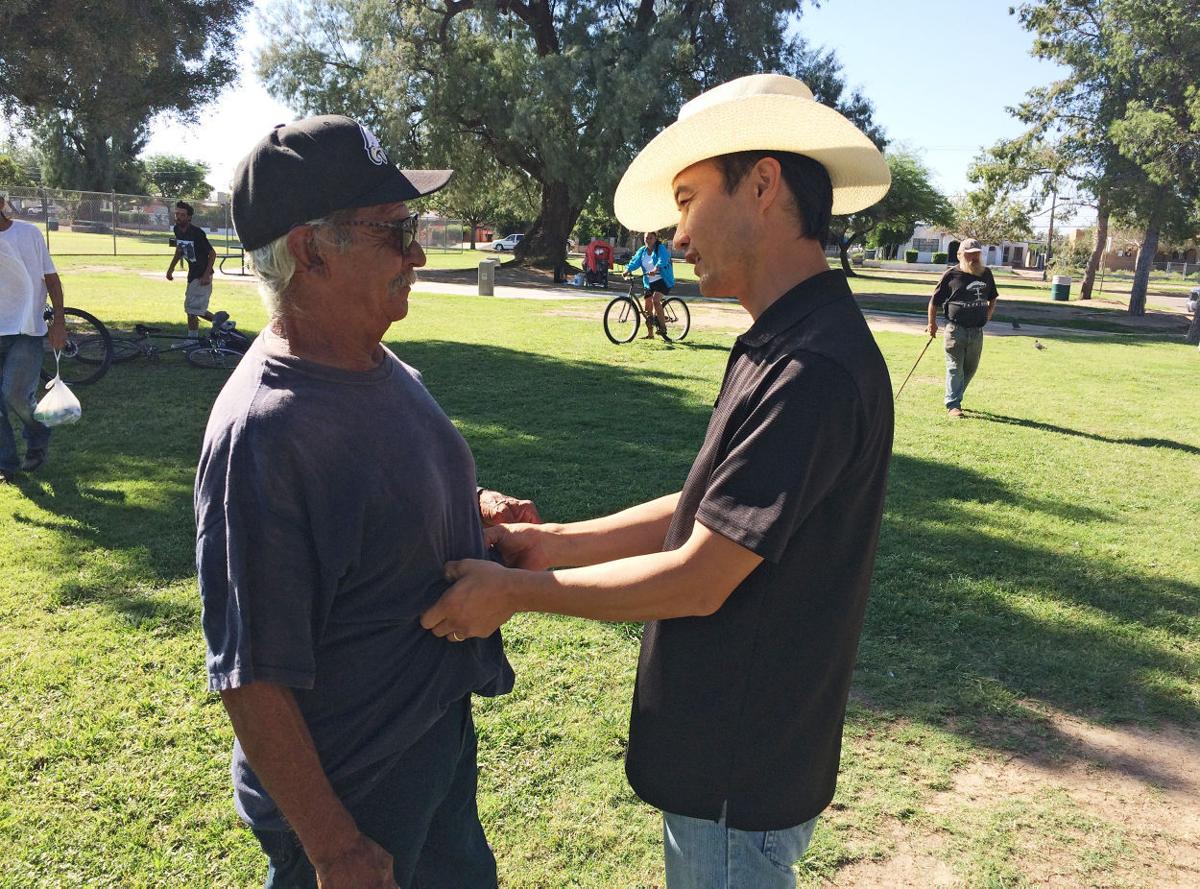He’s a recent immigrant who speaks in accented English that occasionally is hard to follow.
And yet he connects.
Six days a week, Hyun Joung tours Tucson’s homeless population centers — Jácome Plaza, De Anza Park, Santa Rita Park — delivering whatever it is the county allows him to offer. For about three years it was coffee and donuts, but in September the Health Department said he couldn’t deliver donuts. Then it cracked down on the coffee.
Now he serves Pop Tarts or packaged donuts and water — not quite the same attraction.
But the draw isn’t just the food. Joung, 45, who goes by the name Pastor Amos, brings an evangelistic blend of love and enthusiasm that may be just as appreciated as the food and drink.
“He’s for real,” Jesus Escarcega told me at Santa Rita Park.
“What would we do without him?” Brent Candelaria asked.
It’s a peculiar place for Joung to have ended up. He grew up in South Korea, a member of the Presbyterian Church, manned anti-aircraft guns on the North Korean border during his military service and ended up in China before making his way to the Old Pueblo.
Joung was a young, married pastor with no children in 2004 when his church in Korea sent him to Harbin in far northeastern China, to spread the Word. But he went undercover, as a medical instruments salesman, he told me. The communist government tolerates churches to a point but likes to keep them under government control.
It only took a couple of months before someone reported Joung’s covert evangelizing to the Chinese authorities.
“The police tried to capture me,” he said. “Chinese church helped me run away.”
He came to Tucson because his brother was living here, Joung said, and quickly landed a job at one of Tucson’s handful of Korean churches. A few years later, he lost that job and confronted economic disaster.
“I lost my house, I lost my car, I lost my electric power,” he said. “I’m trying to have a job in Tucson, but no one let me have a job.”
It took a couple of years of casting about, but finally Joung received what seemed to be divine inspiration from a meeting with a fellow Korean-church parishioner. The elderly woman gave Joung a coffee pot, and he took it from there.
“The next day I buy some donuts, make some coffee and feeding the homeless,” he said.
It brought him into contact with a whole new world. Some people were sick, some addicted, some just down on their luck. He’s brought many people home to sleep on his floor.
One of them, Derek Allison, got to know Pastor Amos when Allison was sleeping in Veinte de Agosto park.
“When you sleep outside and you wake up on the sidewalk, it’s a depressing, horrible feeling,” he told me Thursday. Joung, he said “has a spirit about him.”
Allison, 33, has become Joung’s sidekick, working with him at the church Joung has founded, called The Loving Church, 166 E. Roger Road. Joung’s congregation of a few dozen people, mostly homeless, shares the sanctuary with a Spanish-speaking church.
On Thursday, Allison and Joung were working on the electricity at the church. Allison, a recovering drug addict, is also staying at Joung’s home.
“He’s a good uncle for my kids,” Joung said of his 7-, 9- and 11-year olds.
But the two are having a hard time trying to keep up their practice of offering food and coffee to people where they are in central Tucson. He understands he really needs a food truck with a county-approved commercial kitchen. The problem is, that could cost upwards of $80,000.
It’s a ridiculous situation for a guy who just wants to give, and for people who are happy to receive both his food and his lively spirit. But Joung continues to look for a way to carry that simplest of tasks, giving a way food and drink. It’s become his calling.
“To me, three years later, I feel like the homeless are my family,” he said. “I know them face to face.”
CAREFUL WHAT YOU
WISH FOR
Former Pima Community College student Terri Bennett got a boost back in 2013 when an advocacy group called Pro English agreed to help pay for her suit against the college. Bennett alleged that she was punished for complaining about fellow students speaking Spanish in the classroom.
In August, a unanimous jury found against Bennett and in favor of the college, then this month Pima County Superior Court Judge Richard Fields added injury to that insult: He ordered Bennett to pay $111,000 of the college’s legal fees.
So now the question arises: Who pays? Will Pro English, or is it going to forget about her now that she has failed to serve its purpose?
I asked Robert Vandervoort, executive director of the group, and her attorney, John Munger. Both said they are hopeful the decision can be reversed, and indeed Munger filed a request for Fields to reconsider his decision on Thursday. But Bennett is clearly in danger of being stuck with the bill.
“The judgment is against Terri Bennett,” Munger said, “and so Terri will have to work out some way to get it resolved.”
MCSALLY’S FEC-FREE QUARTER
U.S. Rep. Martha McSally got a double dose of good news when she reported her contributions Oct. 15. Not only did she report about $790,000 new donations and about $1.7 million in cash on hand, she also went through a quarter without the Federal Elections Committee filing a new demand against her campaign.
McSally’s campaign has been under an unusual amount of FEC scrutiny for years, due in part to numbers that did not add up from period to period and due to unusually large numbers of donors who did not report their occupation. The last FEC demand for information was June 10. Could she finally be resolving her regulatory problems?





